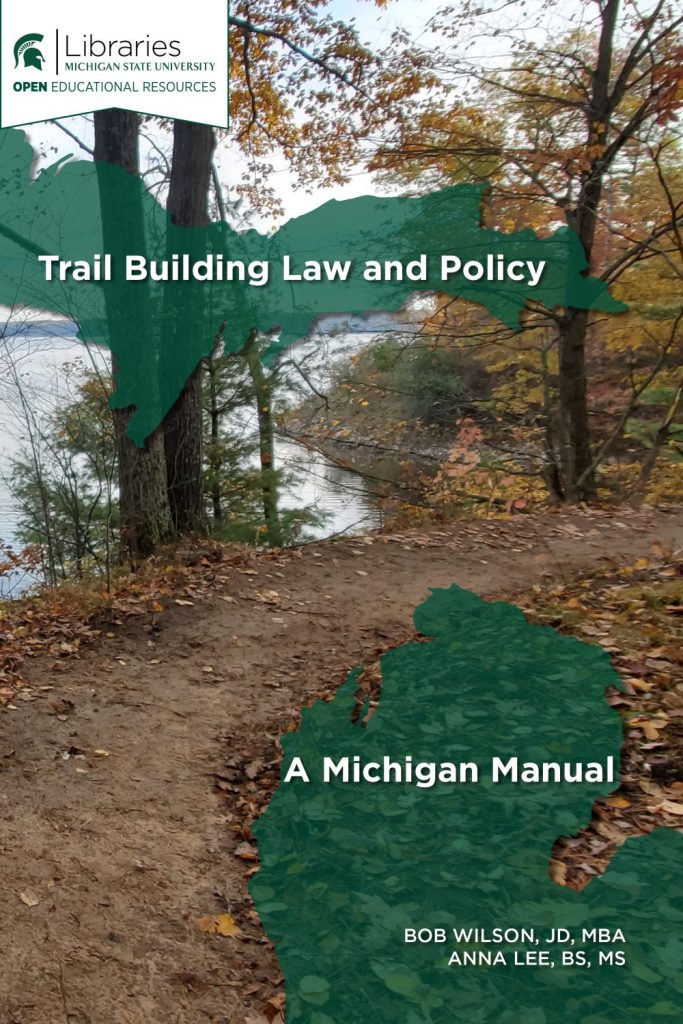MSU students partner with Michigan communities to improve trail access
Trail Building, Law and Policy course connects student projects to community development

EAST LANSING, Mich. – Michigan State University students, under the direction of Instructor Bob Wilson, are collaborating with communities across Michigan to improve access and maintenance of local trails, parks and waterways.
For the past four years, students in the Trail Building, Law and Policy course in The Department of Community Sustainability, have completed a project requiring them to design a trail plan specific to the needs of communities in Michigan.
Wilson, who previously served as Senior Counsel to the Senate Natural Resources and Environmental affairs committee and executive director of the Michigan Trails and Greenways Alliance, coordinates with the Michigan Department of Natural Resources (DNR) to identify communities seeking assistance in trail planning and development. Currently more than a dozen communities in Michigan are on a waiting list for the next semester of students.
“We developed this idea, in collaboration with the DNR, to identify communities that were interested in working with our students to design a master trail plan, and it’s just taken off from there,” said Wilson, an instructor of environmental law at MSU for more than 25 years. “We thought, ‘why not use this course to develop the next generation of trail managers in Michigan?’”
“The DNR and statewide Trail Coordinator Tim Novak have been invaluable to our ability to offer this program – contributing funding and academic support for the last few years, and recently we’ve reached a commitment to fund the class for the next five years,” Wilson said.
The students work directly with community leaders to create a vision for trails, parks and water access and then spend the semester learning the process of trail design and applying those lessons to the design of a master trail plan for their respective community. The final project is a complete trail plan the students present to community leaders.
“The community gets the benefit of a well-done trail plan, and the students learn how their work can impact a community in terms of quality of life and access to trails,” Wilson said. “Trails are the number one local recreational need in Michigan. To meet the demand of our growing communities, we need a new generation of trail leaders in the state who understand the practice and policy of designing and maintaining trails and waterways. We have an opportunity at MSU to grow those leaders.”
 Coursework throughout the semester is applied to issues the students face within their respective communities. Courses are based off research and history gathered in the “Trail Building Law and Policy – A Michigan Manual,” updated in 2025 and released in partnership with the MSU Open Educational Resources Program. Authored by Wilson and MSU graduate Anna Lee, an energy and environmental sector consultant with Public Sector Consultants, the manual serves as a comprehensive guide to trail law, policy, history and management in Michigan.
Coursework throughout the semester is applied to issues the students face within their respective communities. Courses are based off research and history gathered in the “Trail Building Law and Policy – A Michigan Manual,” updated in 2025 and released in partnership with the MSU Open Educational Resources Program. Authored by Wilson and MSU graduate Anna Lee, an energy and environmental sector consultant with Public Sector Consultants, the manual serves as a comprehensive guide to trail law, policy, history and management in Michigan.
This spring, students in the class designed trail plans for community projects in Charlevoix, Cassopolis, Sault Ste. Marie, Calhoun County and Clearwater Township.
Amelia Beesley, a senior majoring in Environmental Studies and Sustainability, worked with a team of students in Wilson’s course to build a comprehensive trail plan for the Charlevoix community. Wilson has served as a mentor, supportive teacher, and valuable resource during her time at MSU, Beesley said.
“I am currently enrolled or have previously taken all of Instructor Wilson’s classes,” Beesley said. “He provides great speakers and resources during class, has a lot of great experience and goes out of his way to help us by providing little details and advice to help build and improve our plans.”
Beesley and her team developed a master trail plan that provides a general overview of current and future trail design and maintenance, laws and regulations that the community would need to consider and historical storytelling and signage to show history and culture of the community.
The students collaborated with the Top of Michigan Trails Council, Charlevoix city and township, the Charlevoix Chamber of Commerce and Downtown Development Authority and local tribal leaders to understand the background and culture of the area, support for trails, and current and prospective trail projects.
“I was excited joining this class knowing I would be doing this project. I knew it was a good opportunity and valuable experience to work with a community and consolidate tons of local information to build a plan,” Beesley said. “I was also worried I was going to crash and burn. I had never done anything like this before. It’s not just memorizing and reciting laws but really applying it to real people and communities. But working with the enthusiastic residents and local stakeholders made it so much easier than expected and applying that information to the real needs of people I’ve met has been a great experience.”

Marcy Hamilton is Deputy Executive Director and Senior Planner for the Southwest Michigan Planning Commission, covering Berrien, Cass and Van Buren counties. Hamilton is collaborating with students from Wilson’s class to develop a trail plan for the Van-Cass Heritage Trail in Cass County. In her role she serves as a convener and partner assisting with planning and securing funding for the trails and waterways in the area.
“In the last few years, we’ve had great momentum with our trails and parks, and we have many trail projects in planning or in progress in southwest Michigan,” Hamilton said. “Cass County doesn’t have many multi-use trails and doesn’t have a lot of resources to devote to trail building, so, when Bob Wilson reached out for a community that his students could help, we felt that Cass County and Cassopolis would be a great area of focus.”
Students have developed a plan to connect and extend current accessible trails to advance the Van-Cass Heritage Trail – which would connect Cassopolis to Vandalia and provide connections to a local senior center, business park as well as Dr. Lawless International Dark Sky Park.
“Currently, there are no long-distance multi-use trails that connect our communities to vital economic centers and recreation opportunities in Cass County, so this is really going to be the first trail that provides substantial connectivity,” Hamilton said.
Ryan Reincke is a 2023 graduate of the College of Agriculture and Natural Resources and currently serves as the director of the Calhoun County Conservation District.
Reincke was a student in Wilson’s class during his time at MSU. He collaborated with the Calhoun County Trailway Alliance to design a walking trail throughout his home county. As director of the county conservation district, he is now in charge of seeing those plans come to fruition.
“I worked at the Institute of Water Research at MSU for about a year during school, and then after school, I had the opportunity to come home and work where I grew up, In Calhoun County,” Reincke said. “It was an opportunity I couldn't pass up – coming home and doing projects that I always thought of doing as a young person, so I am really excited to be here and doing projects on the water.”
Reincke partnered with students from Wilson’s class to build a management plan for the trails and waterways, specifically focused on management debris on trails and waterways; maintaining private property, fish habitat and environmental sustainability; emergency and flood planning; and ensuring equitable public access.
“The Calhoun County Parks Commission recently did an update to its master plan, and we received a bunch of input throughout the county and one of their top responses we received was improving access and maintenance of water trails within the county. So, I thought that was a perfect opportunity to partner with MSU to formulate a plan to enhance and maintain our water trails.”
Reincke credits Wilson for helping open the door to his dream job and said his collaboration with the students this year has provided unique perspectives and novel ideas that have aided the development of a comprehensive trail and waterway management plan.
“Bob’s class gets MSU students out in the community and on the ground doing the work that people in that community will enjoy for generations,” Reincke said. “Bob served as a mentor for me during my time at MSU. I used my trail plan during job interviews to discuss the attention to detail and the complexity of the projects we did in the class.”
Adam de la Fuente, a senior majoring in environmental economics and management from Rochester Hills, Michigan, is working with Dave Halachukas, Outreach Coordinator for Clearwater Township Parks and Recreation, to connect and develop trails in Kalkaska County that will converge at the new Patriot Park Veterans Memorial in Rapid City, Michigan.
De la Fuente and his group collaborated with TART Trails and Clearwater Township to design a trail system that will connect various access points in the county, including several around Torch Lake, to a newly developed, 80-acre park. Patriot Park Veterans Memorial in Rapid City will feature views of the Old Mission Peninsula, Lake Skegemog, and Torch Lake, an honorary plaza honoring military veterans, disc golf, mountain biking and a community center.
“I moved to Clearwater Township from Traverse City and saw so many beautiful lakes and parks in the area that I wanted to get involved and help that grow. We started planning the Patriot Park Veterans Memorial, and it’s really become our baby,” Halachukas said. “Connecting with Instructor Wilson’s class and working with TART trails has helped us bring our vision to reality, and we’ve really got a cool thing going. It's really going to snowball into just an unbelievable thing here for our community.”
The TART Trails network consists of several multi-use trails in Grand Traverse and Leelanau counties as well as a cross-town bike route. TART Trails mission is to provide and promote a trail network that enriches people and communities throughout the greater Traverse region. De la Fuente worked with the TART Trails Team to implement and incorporate existing designs into his trail plan.
De la Fuente served as the primary point of contact and facilitator for his group’s project. Collaborating with local leaders allowed his team to incorporate the concerns and needs of the community while addressing issues and potential pitfalls in trail and park development.
“It's been super awesome working with different stakeholders and making sure their interests are heard and considered,” said de la Fuente, who plans to pursue a career in public policy or urban planning. “Everyone I've spoken to has been willing to help and very excited about the project, which is really cool to see and makes me feel good about the work I’m doing.”



 Print
Print Email
Email


